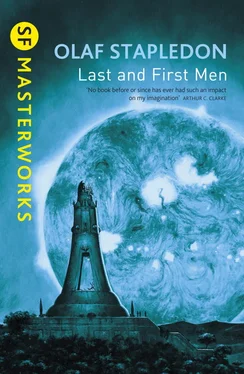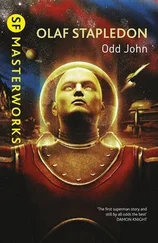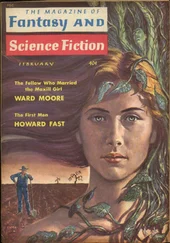During this harangue her composure was restored, though she glanced now and then at the American, who kept ever removing his gaze from her.
She answered in much the same diction as the other; but, surprisingly, with an old-time English accent, “I am certainly a mongrel. You might call me, not daughter of Ocean, but daughter of Man; for wanderers of every race have scattered their seed on this island. My body, I know, betrays its diverse ancestry in a rather queer blend of characters. My mind is perhaps unusual too, for I have never left this island. And though it is actually less than a quarter of a century since I was born, a past century has perhaps had more meaning for me than the obscure events of today. A hermit taught me. Two hundred years ago he lived actively in Europe; but towards the end of his long life he retreated to this island. As an old man he loved me. And day by day he gave me insight into the great spirit of the past; but of this age he gave me nothing. Now that he is dead, I struggle to familiarize myself with the present, but I continue to see everything from the angle of another age. And so” (turning to the American), “if I have offended against modern customs, it is because my insular mind has never been taught to regard nakedness as indecent. I am very ignorant, truly a savage. If only I could gain experience of your great world! If ever this war ends, I must travel.”
“Delectable,” said the Chinese, “exquisitely proportioned, exquisitely civilized savage! Come with me for a holiday in modern China. There you can bathe without a costume, so long as you are beautiful.”
She ignored this invitation, and seemed to have fallen into a reverie. Then absently she continued, “Perhaps I should not suffer from this restlessness, this craving to experience the world, if only I were to experience motherhood instead. Many of the islanders from time to time have enriched me with their embraces. But with none of them could I permit myself to conceive. They are dear; but not one of them is at heart more than a child.”
The American became restless. But again the Mongol intervened, with lowered and deepened voice. “I,” he said, “I, the Vice-President of the World Finance Directorate, shall be honoured to afford you the opportunity of motherhood.”
She regarded him gravely, then smiled as on a child who asks more than it is reasonable to give. But the Amercian rose hastily. Addressing the silken Mongol, he said, “You probably know that the American Government is in the act of sending a second poison fleet to turn your whole population insane, more insane than you are already. You cannot defend yourselves against this new weapon; and if I am to save you, I must not trifle any longer. Nor must you, for we must act simultaneously. We have settled all that matters for the moment. But before I leave, I must say that your behaviour toward this woman has very forcibly reminded me that there is something wrong with the Chinese way of thought and life. In my anxiety for peace, I overlooked my duty in this respect. I now give you notice that when the Directorate is established, we Americans must induce you to reform these abuses, for the world’s sake and your own.”
The Chinese rose and answered, “This matter must be settled locally. We do not expect you to accept our standards, so do not you expect us to accept yours.” He moved toward the woman, smiling. And the smile outraged the American.
We need not follow the wrangle which now ensued between the two representatives, each of whom, though in a manner cosmopolitan in sentiment, was heartily contemptuous of the other’s values. Suffice it that the American became increasingly earnest and dictatorial, the other increasingly careless and ironical. Finally the American raised his voice and presented an ultimatum. “Our treaty of world-union,” he said, “will remain unsigned unless you add a clause promising drastic reforms, which, as a matter of fact, my colleagues had already proposed as a condition of cooperation. I had decided to withhold them, in case they should wreck our treaty; but now I see they are essential. You must educate your people out of their lascivious and idle ways, and give them modern scientific religion. Teachers in your schools and universities must pledge themselves to the modern fundamentalized physics and behaviourism, and must enforce worship of the Divine Mover. The change will be difficult, but we will help you. You will need a strong order of Inquisitors, responsible to the Directorate. They will see also to the reform of your people’s sexual frivolity in which you squander so much of the Divine Energy. Unless you agree to this, I cannot stop the war. The law of God must be kept, and those who know it must enforce it.”
The woman interrupted him. “Tell me, what is this ‘God’ of yours? The Europeans worshipped love, not energy. What do you mean by energy? Is it merely to make engines go fast, and to agitate the ether?”
He answered flatly, as if repeating a lesson, “God is the all-pervading spirit of movement which seeks to actualize itself wherever it is latent. God has appointed the great American people to mechanize the universe.” He paused, contemplating the clean lines of his seaplane. Then he continued with emphasis, “But come! Time is precious. Either you work for God, or we trample you out of God’s way.”
The woman approached him, saying, “There is certainly something great in this enthusiasm. But somehow, though my heart says you are right, my head is doubting still. There must be a mistake somewhere.”
“Mistake!” he laughed, overhanging her with his mask of power. “When a man’s soul is action, how can he be mistaken that action is divine? I have served the great God, Energy, all my life, from garage boy to World President. Has not the whole American people proved its faith by its success?”
With rapture, but still in perplexity, she gazed at him. “There’s something terribly wrong-headed about you Amer icans,” she said, “but certainly you are great.” She looked him in the eyes. Then suddenly she laid a hand on him, and said with conviction, “Being what you are, you are probably right. Anyhow you are a man, a real man. Take me. Be the father of my boy. Take me to the dangerous cities of America to work with you.”
The President was surprised with sudden hunger for her body, and she saw it; but he turned to the Vice-President and said, “She has seen where the truth lies. And you? War, or cooperation in God’s work?”
“The death of our bodies, or the death of our minds,” said the Chinese, but with a bitterness that lacked conviction; for he was no fanatic. “Well, since the soul is only the harmoniousness of the body’s behaviour, and since, in spite of this little dispute, we are agreed that the coordination of activity is the chief need of the planet today, and since in respect of our differences of temperament this lady has judged in favour of America, and moreover since, if there is any virtue in our Asiatic way of life, it will not succumb to a little propaganda, but rather will be strengthened by opposition — since all these matters are so, I accept your terms. But it would be undignifled in China to let this great change be imposed upon her externally. You must give me time to form in Asia a native and spontaneous party of Energists, who will themselves propagate your gospel, and perhaps give it an elegance which, if I may say so, it has not yet. Even this we will do to secure the cosmopolitan control of Antarctica.”
Thereupon the treaty was signed; but a new and secret codicil was drawn up and signed also, and both were witnessed by the Daughter of Man, in a clear, round, oldfashioned script.
Then, taking a hand of each, she said, “And so at last the world is united. For how long, I wonder. I seem to hear my old master’s voice scolding, as though I had been rather stupid. But he failed me, and I have chosen a new master, Master of the World.”
Читать дальше











